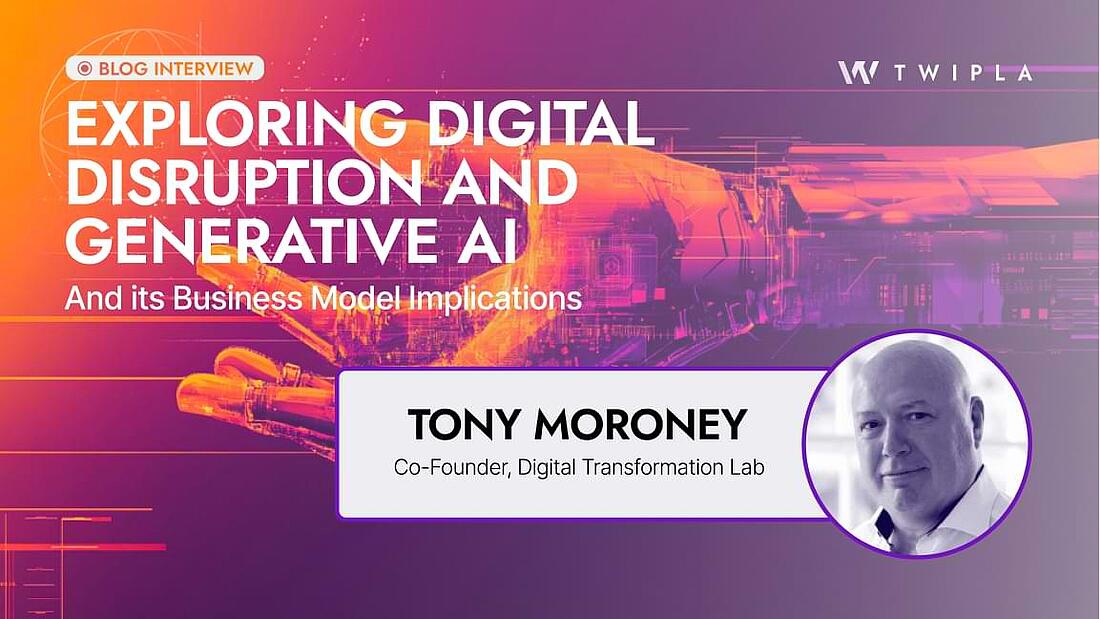- Why Us?
- Features
White Label
For SaaS Platforms & Agencies
Provide our complete analytics suite to your clients, directly within your own interface and with your/their own branding. Discover Analytics-as-a-Service and White Label Analytics. Great benefit, minimal effort.
- Pricing
- White Label
- Success Stories
- ResourcesGetting Started
CONTENTS
- What does digital disruption mean for traditional business models?
- What are the key challenges for businesses embarking on a digital transformation journey?
- What are some innovative ways companies are using AI to differentiate themselves from their competitors?
- Thanks for the interview, Tony. To wrap things up, what do you think are the key takeaways people need to understand about digital transformation?

Digital Disruption, Transformation, and Generative AI
As digital transformation reshapes business, TWIPLA’s Jorge Cuevas spoke with advisor and Harvard Business Review Advisory Council member Tony Moroney on how companies can adapt and thrive.
What does digital disruption mean for traditional business models?
Leaders must anticipate and embrace innovation, leveraging sensemaking, adaptability, and communication skills for a rapidly disrupted, hyper-connected, digitalised world if their organisations are to survive.
Digital disruption, an inevitable force of transformation, reshapes traditional business models. As markets and customer preferences evolve, traditional businesses must rethink their strategies or risk decline or extinction.
The competitive landscape is also being redefined, with barriers to entry consistently being lowered, allowing startups and tech-savvy companies to challenge established players. The global reach now enabled by disruptive digital technologies exacerbates the threat, making adaptation a matter of survival.
Over the past few years, disruption has accelerated, if anything. From extended reality to generative AI, from 5.5G and immersive technologies and digital worlds to cybersecurity and the promise of quantum computing at some future date. This relentless pace of disruption has left many executives and their businesses wondering how they can survive, never mind harnessing the benefits of digital disruption.
This is not surprising as most of these technologies are new, at least in their current form. The critical challenge executives face is making sense of them from a business perspective and taking steps to ensure their business remains relevant and competitive in the future.
Leaders must anticipate and embrace innovation, leveraging sensemaking, adaptability, and communication skills for a rapidly disrupted, hyper-connected, digitalised world if their organisations are to survive.
Notwithstanding, while technology is crucial, the real challenge that cannot be understated is transformational leadership. The weight of this role in navigating the digital transformation is significant and cannot be overlooked. It's not just about adopting new technologies but about leading the organisation through a fundamental shift in mindset and culture.

What are the key challenges for businesses embarking on a digital transformation journey?
Leaders must recognise this is about hearts and minds and address employee fears while simultaneously inspiring, aligning, and achieving organisational buy-in. This means addressing what transformation means for our people and explaining their roles (and skills) in digital transformation today, tomorrow, and in the future.
Embarking on a digital transformation journey presents a multitude of challenges for businesses, often making the journey more complex and demanding than initially anticipated. One of the most significant obstacles is the lack of a clear and comprehensive strategy.
Arguably, most businesses don’t set out to digitally transform. Instead, many implement technology and wonder why the organisation has not changed. The simple answer is that a digital technology overlay on an otherwise analogue organisation, with an analogue mindset and culture, will always be suboptimal at best.
Ironically, organisations would be better served if they dropped the word digital and focused instead on transformation. Transformation implies transformative change through people, not just incremental change or new technologies.
It is driven by a vision of what it will take to remain relevant and competitive. It is based on an understanding that the world is increasingly digitalised, which has implications for what our customers and stakeholders will expect.
Leaders must, therefore, anticipate and embrace innovation. Leaders must also create a clear and compelling future vision and communicate it effectively. They must also break down silos and promote cross-functional teamwork based on customer expectations.
Ultimately, leaders set the direction for their organisation, guiding it through the complexities of the digital age. Critically, though, we are not transforming because of the technology. We may use technology to transform, but it is not the reason for transformation.
Leaders must recognise this is about hearts and minds and address employee fears while simultaneously inspiring, aligning, and achieving organisational buy-in. This means addressing what transformation means for our people and explaining their roles (and skills) in digital transformation today, tomorrow, and in the future.

What are some innovative ways companies are using AI to differentiate themselves from their competitors?
AI is not a silver bullet. It is a disruptive technology and should be an integral part of every organisation’s digital transformation. The concern is that notwithstanding its potential, many organisations will continue to look at AI as a means of automation and cost reduction.
Adopting generative AI presents a unique challenge. Previous technological disruptions took time to evolve and disrupt, with the speed of adoption determined by factors such as awareness, internal adaptation, and ecosystem readiness.
However, most customers and employees now enthusiastically use generative AI, with its performance and accuracy steadily improving and heightening expectations.
But AI is not a silver bullet. It is a disruptive technology and should be an integral part of every organisation’s digital transformation. The concern is that notwithstanding its potential, many organisations will continue to look at AI as a means of automation and cost reduction.
While this is important, arguably, it's table stakes as almost every organisation will do this, and as such, it will not create a competitive advantage. If an organisation wants to use AI as a basis for differentiation, it needs to look at how AI can create new value and insights and pivot its organisation accordingly.
To succeed, organisations must develop the capability to leverage data and analytics to gain new insights into customer behaviours and expectations. This means investing in technologies and systems, including scalable and flexible AI-ready infrastructure, data analytics capabilities, and cybersecurity measures to leverage and protect their digital assets.
However, AI will only be as good as the data used to train its learning models, yet many organisations do not have robust and complete data. This has to be a key starting point.
Another critical area is the ethical and responsible use of data for AI within the business. It is concerning that organisations are not giving this sufficient attention. Every employee has access to generative AI on smart devices, and studies have already shown that these technologies are being used, often without guidance or permission.
Leaders must set the tone regarding what is right for their customers and stakeholders. If we support our employees with supportive guardrails, we can harness tools such as AI to add tangible value and, in the process, differentiate our business.
Thanks for the interview, Tony. To wrap things up, what do you think are the key takeaways people need to understand about digital transformation?
Now is the time for organisations to reassess their strategies, break down internal silos, and commit to a future where digital transformation is not just a goal but a continuous, evolving process. The leaders who can navigate these complexities will be the ones who not only survive but thrive in the digital age.
In an era where digital disruption is an inevitable force reshaping industries, the path to survival and success lies in visionary leaders who can guide their organisations through technological advancements and the necessary cultural shifts.
Businesses must adopt new technologies and foster a culture of innovation and adaptability, where every employee understands their role in the digital transformation journey.
As AI and other emerging technologies continue to evolve, ethical considerations and robust data practices will distinguish the leaders from the laggards.
Now is the time for organisations to reassess their strategies, break down internal silos, and commit to a future where digital transformation is not just a goal but a continuous, evolving process. The leaders who can navigate these complexities will be the ones who not only survive but thrive in the digital age.

About Tony Moroney
Tony Moroney is the Principal at The Digital Explorer and Co-Founder of The Digital Transformation Lab at Cork University Business School. With over 42 years of experience in financial services and consulting, Tony is a globally recognized expert in digital transformation, digital disruption, and financial services.
Named a Top Voice by LinkedIn and a Top 100 Thought Leader by Thinkers360, he is a sought-after keynote speaker on digital disruption and frequently contributes to international forums. Tony serves on various prestigious boards, including the World Business Angels Investment Forum, and holds MBAs from University College Dublin and Bangor University.
Share article
Get Started for Free
Gain World-Class Insights & Offer Innovative Privacy & Security

You might also like
Enterprise Analytics: Boosting Digital Data Efficiency for Big Businesses 29 February 2024 - by Simon Coulthard
29 February 2024 - by Simon Coulthard











